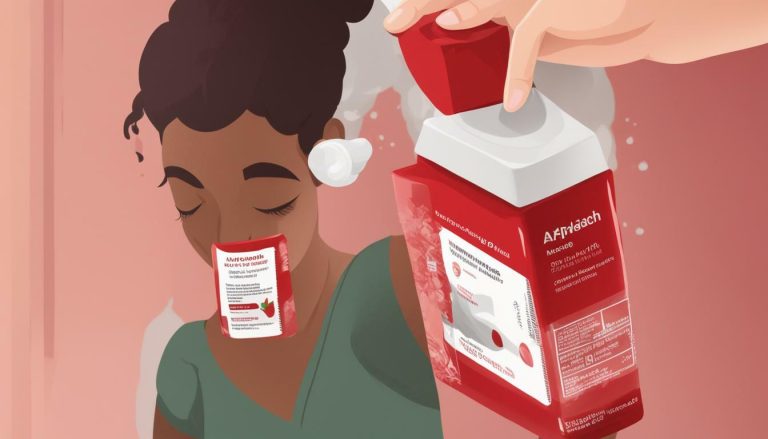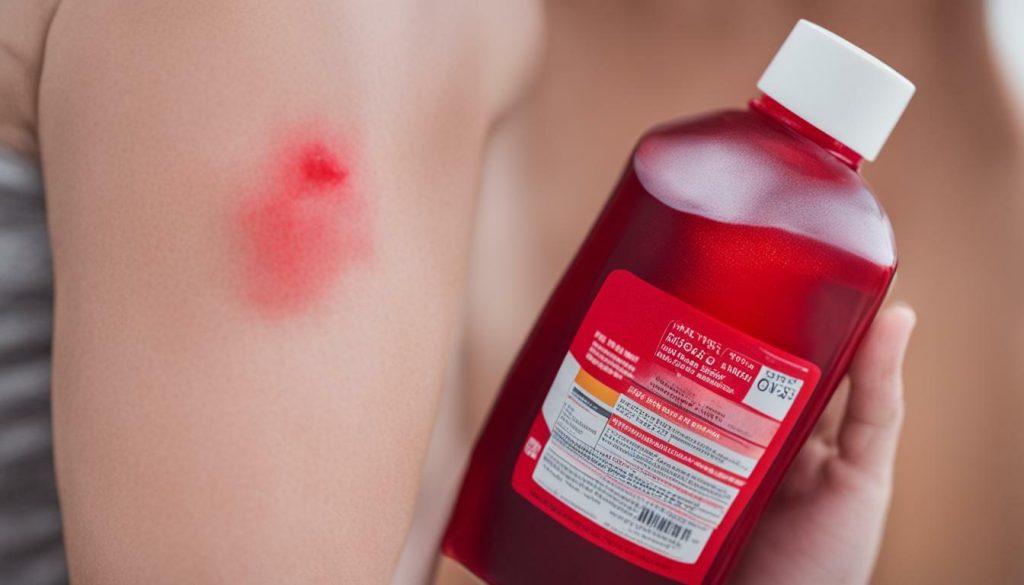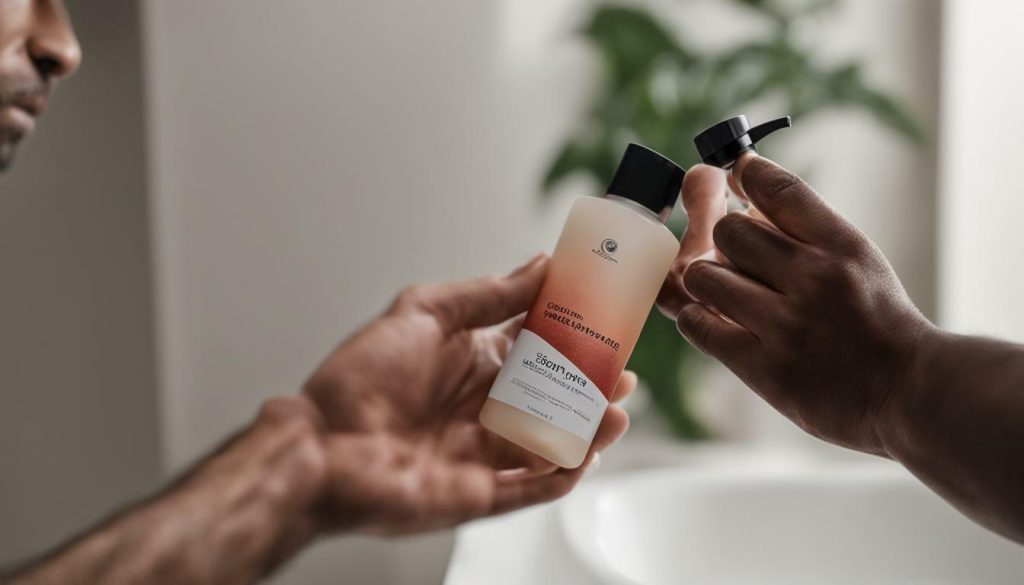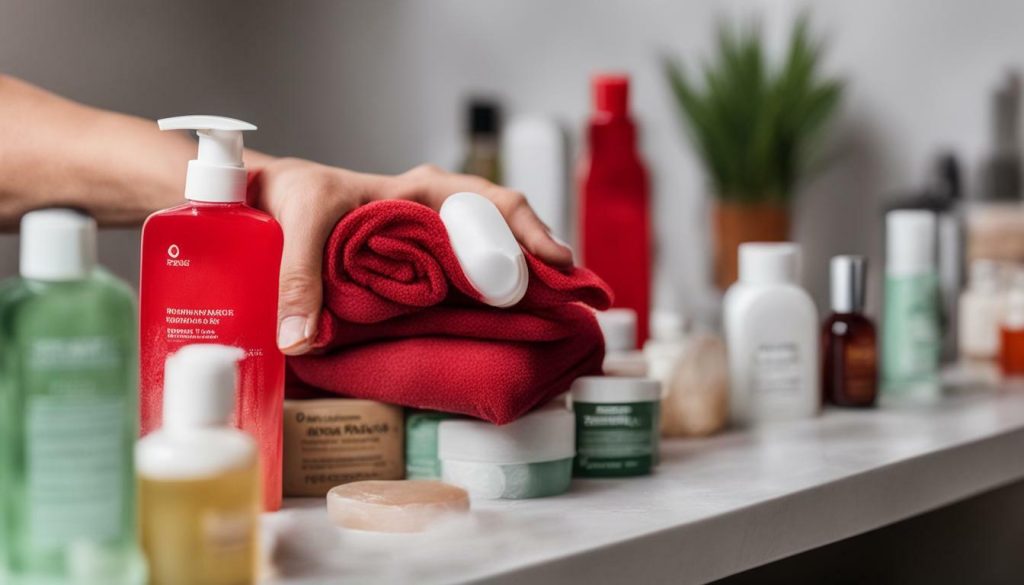Have you ever experienced an itchy, uncomfortable rash after using a new body wash? Allergic reactions to body wash can be irritating and even painful, but fortunately, there are ways to alleviate your symptoms. In this section, we will discuss the different methods of treating an allergic reaction to body wash so that you can soothe your skin and prevent future reactions.
The first step in treating an allergic reaction to body wash is to identify the symptoms. Common signs include itching, redness, rash, hives, swelling, and dryness. Once you have recognized the symptoms, you can begin to take steps to alleviate your discomfort.
- To effectively treat an allergic reaction to body wash, you must understand the symptoms, causes, and treatment options.
- Symptoms of an allergic reaction to body wash include itching, redness, rash, hives, swelling, and dryness.
- Identifying the causes of allergic reactions to body wash is crucial for prevention.
- For mild reactions, gentle cleansing routines and applying soothing remedies can be effective.
- Over-the-counter treatments such as antihistamines and hydrocortisone creams can help manage moderate reactions.
Symptoms of Allergic Reaction to Body Wash
It can be alarming to experience an allergic reaction to body wash, but recognizing the symptoms early on is crucial for seeking appropriate treatment. Common signs of an allergic reaction to body wash include:
- Itching
- Redness
- Rash
- Hives
- Swelling
- Dryness
If you experience any of these symptoms after using a body wash, discontinue use immediately and seek appropriate treatment to prevent the reaction from worsening. It is also important to note that the severity of symptoms can vary from person to person, with some experiencing mild irritation while others may have a severe allergic reaction.
Recognizing body wash allergy symptoms early on can help with identifying the appropriate treatment.
Causes of Allergic Reactions to Body Wash
It’s important to understand the causes of allergic reactions to body wash to prevent future reactions. Chemical ingredients in body wash can trigger an allergic reaction, including fragrance, preservatives, and dyes. Fragrances can be particularly problematic as they often contain various allergens that can cause skin irritation. Preservatives such as parabens and formaldehyde-releasers can also cause an allergic reaction. Additionally, certain chemicals like sodium laureth sulfate, which is a common foaming agent in many body washes, can strip away natural oils from the skin and cause dryness and exacerbate pre-existing conditions.
Other triggers for allergic reactions to body wash may include underlying skin conditions, such as eczema or psoriasis, that increase skin sensitivity. Genetics can also play a role in developing an allergic reaction to certain ingredients in body wash. If you have a history of allergies, it’s important to be cautious when trying new products.
When selecting body washes, look for products marketed as hypoallergenic or fragrance-free. Consider performing a patch test before using a new product by applying a small amount to a small area of skin to check for any adverse reactions. If you have a history of allergies, it may be beneficial to consult with a dermatologist to identify any potential allergens in your skincare routine.
How to Manage Mild Allergic Reactions
If you experience mild allergic reactions to body wash, there are several steps you can take to alleviate discomfort and promote healing. Here are some tips for managing mild body wash allergies:
- Switch to a hypoallergenic or fragrance-free body wash. These products are designed to be gentler on the skin and less likely to cause an allergic reaction.
- Avoid using hot water, which can further dry out and irritate the skin. Instead, use lukewarm water during showers or baths.
- Gently cleanse the affected area with a mild soap and water. Avoid rubbing or scratching the skin, which can worsen the allergic reaction.
- Apply a cold compress to the affected area to reduce inflammation and itching. Use a clean, damp cloth or towel and hold it against the affected skin for 10-15 minutes at a time.
- Moisturize the affected area with a hypoallergenic lotion or cream. This helps soothe the skin and prevent further drying.
- If the itching is severe, an over-the-counter antihistamine may provide relief. However, consult with a healthcare professional before taking any medication.
Remember, it’s important to avoid scratching or rubbing the affected area, as this can lead to further irritation and potential infection. If your symptoms persist or worsen, seek medical attention for proper evaluation and guidance.
Using hypoallergenic products can help reduce the risk of allergic reactions to body wash.
Over-the-Counter Treatments for Allergic Reactions
When dealing with a moderate allergic reaction to body wash, over-the-counter treatments can provide much-needed relief. These treatments can help alleviate symptoms such as itching, swelling, and redness.
Antihistamines: Over-the-counter antihistamines, such as Benadryl, can help relieve allergic reaction symptoms. These medications block the release of histamines, which cause itching and inflammation. Consult with your doctor or pharmacist before taking antihistamines, especially if you have any underlying medical conditions or are taking other medications.
Hydrocortisone Creams: Hydrocortisone creams can help reduce itching, redness, and swelling. These topical creams are available without a prescription and can be applied directly to affected areas. Be sure to follow the instructions on the packaging closely and avoid using them on large areas of your body or for an extended period.
Oatmeal Baths: Oatmeal has natural anti-inflammatory properties that can help soothe irritated skin. You can add colloidal oatmeal, which is finely ground oatmeal, to a lukewarm bath for added relief. Soak in the bath for 10-15 minutes and gently pat your skin dry afterward.
| Treatment Option | Usage Instructions |
|---|---|
| Antihistamines | Take as directed by your doctor or pharmacist |
| Hydrocortisone Creams | Apply a thin layer directly to affected areas, no more than three times a day |
| Oatmeal Baths | Add colloidal oatmeal to lukewarm bathwater and soak for 10-15 minutes |
Remember, while over-the-counter treatments can provide short-term relief, they may not be sufficient for severe allergic reactions. If your symptoms persist or worsen, seek medical attention immediately.
If you are experiencing severe symptoms of a body wash allergy such as difficulty breathing or swelling of the lips, tongue, or throat, seek medical attention immediately. These symptoms can indicate a severe allergic reaction that requires emergency care.
When you visit a healthcare professional for a severe allergic reaction, they will likely perform a physical examination and evaluate your symptoms. They may also administer medications such as epinephrine or corticosteroids to alleviate symptoms and prevent complications.
It is important to follow your healthcare professional’s instructions and continue any prescribed treatment even after your symptoms improve. Failure to do so can increase the risk of future severe allergic reactions.
Remember, in case of a severe allergic reaction, do not hesitate to call emergency services or visit the nearest emergency department.
Preventing Future Allergic Reactions
Preventing future allergic reactions to body wash is essential for maintaining healthy and comfortable skin. Here are some practical tips:
- Select hypoallergenic products. Look for body washes that are labeled as hypoallergenic or for sensitive skin. These products are formulated to minimize the risk of allergic reactions.
- Perform patch tests. Before using a new body wash, perform a patch test to determine if you are sensitive to any of its ingredients. Apply a small amount of the product to a small area of skin and wait 24-48 hours to see if any reaction occurs.
- Take precautions to minimize skin sensitivity. Avoid hot showers, steam rooms, and saunas as these can strip your skin of its natural oils. Additionally, use lukewarm water instead of hot water when you shower and pat your skin dry instead of rubbing it with a towel.
By following these precautions, you can minimize the risk of skin sensitivity and reduce the chance of future allergic reactions.
Now that you understand how to treat and prevent allergic reactions to body wash, you can take the necessary steps to maintain healthy skin. Remember, identifying the symptoms early on is key to seeking appropriate treatment. If you experience mild skin irritation, try using gentle cleansing routines and soothing remedies like cold compresses and moisturizers.
If your symptoms persist or worsen, consider using over-the-counter remedies like antihistamines, hydrocortisone creams, and oatmeal baths for moderate reactions. However, if you experience severe reactions, seek immediate medical attention for proper evaluation and treatment.
To prevent future reactions, choose hypoallergenic products, perform patch tests, and take precautions to minimize skin sensitivity. By following these steps, you can maintain healthy and comfortable skin. If you have any concerns or questions, consult a healthcare professional for proper evaluation and guidance.

Hey there! I’m Dr. Mary Noland, your trusted authority in dermatology. My 17-year rollercoaster ride in skin science has been nothing short of a masterclass. Whether you’re a newbie or a familiar face, I’m here with open arms and Medicare-friendly services, dedicated to creating your perfect skin haven.
But hold up! There’s more to me. When I’m not elbow-deep in dermatology, I’m lighting up derma blogs with insights that peel back the layers of skin health. Also, as the proud captain of ‘buybodywash.com‘, I provide all the body care goodness you need!
Trust me; I’m more than just a white coat. I’m here to lend an ear, share a laugh, and bring calm with a reassuring voice that’s comforted countless patients.
So, meet Dr. Mary Noland – your dermatologist and your guide and friend on the path to radiant skin. I am excited to meet you soon!







